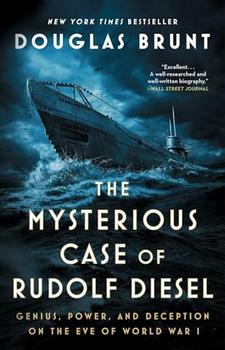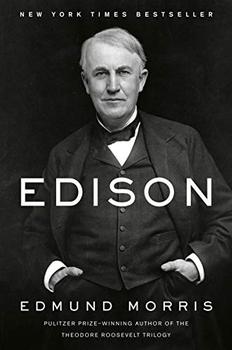Summary | Excerpt | Reviews | Beyond the book | Read-Alikes | Genres & Themes | Author Bio

Genius, Power, and Deception on the Eve of World War I
by Douglas BruntRudolf Diesel ought to be a household name. Like Thomas Edison, Henry Ford and Nikola Tesla, Diesel (born in 1858) invented something that changed the world: the internal combustion engine, successfully developed in 1897. But although "diesel engine" and "diesel fuel" have become common parlance, the man behind those terms has slid into obscurity, after he reached worldwide fame only to vanish in 1913. What happened to Diesel, and why has he been largely forgotten? In The Mysterious Case of Rudolf Diesel, Douglas Brunt tells the story of the great inventor—his background, his work, his aspirations—and provides compelling evidence that there was more to Diesel’s disappearance than was initially believed.
Befitting a book about the invention of a new type of engine, especially one that radically changed the field of transportation and played a significant role in World War I, Diesel is packed with facts and information. At the same time, Diesel tells the life story of a person who overcame childhood poverty and persecution to become a brilliant inventor and a loving family man with an altruistic heart. Woven in and around the technical explanations, military history and political analysis, Diesel’s story is thoroughly researched and well-written, giving a clear picture of Diesel’s motivations and his joy in discovery. Nonetheless, for some readers, the overwhelming density of the technical explanations may outweigh the compelling narrative. Brunt does helpfully provide a diagram of Diesel’s engine, and he uses clear imagery and examples from media to explain the complicated mechanics and engineering feats that contributed to the success of Diesel’s invention. Likewise, at the end of the book Brunt includes a list of Diesel manufacturing firms and a timeline of Diesel’s life and related events; these resources are helpful in keeping the many dates and names (including those of several significant foreign manufacturers) straight and allow even the least mechanically minded readers to follow along.
Similarly dense but necessary is the extensive background on the political tensions between Germany and Britain, as well as the impact of the diesel engine on magnates, such as John D. Rockefeller, whose businesses were threatened by the innovation. Brunt provides a thorough overview of political and societal upheaval in France, Germany and the rest of Europe that not only forced Diesel to flee his home several times throughout his youth but that also set the stage for WWI. Several additional chapters are spent almost exclusively following political maneuverings or detailing the advancements made to Diesel’s engines, and although some readers may find these sections slow, these details come together to provide essential background on how Diesel’s invention spurred the military intentions of the German Kaiser Wilhelm II and the British First Lord of the Admiralty, Winston Churchill.
But why was the diesel engine so revolutionary? Because it was, overall, significantly more appealing than other engines. It had a better output, it utilized stable, cheaper fuels and its exhaust was nearly invisible. Furthermore, it utilized a cold start, meaning that it didn’t need external fuel, time and a team of laborers to start. Although Diesel’s goal in building his engine was to provide power to small businesses and help maintain rural economies, once he signed over licensing of the product to other manufacturing firms, a tactic he used to spread the development and production of his expensive invention, he could no longer control how his engine was used. Unsurprisingly, the engine’s greater efficiency and use of cheaper fuels immediately saw its implementation in transportation, both for commercial and military use. A cold start meant that trains and ships could convert the space once used for coal and crew to carry more cargo, thus increasing profits; from a military perspective, the diesel engine allowed ships to travel faster, further and longer, making them more of a threat and therefore a necessity in a world on the brink of war.
After a detailed and extensive account of Diesel’s life and the wide range of people, places and events impacted by his engine, Brunt focuses on his death. The final section of the book explores his mysterious disappearance off a British passenger ship in late 1913. Although it’s long been accepted that Diesel died by suicide, Brunt presents compelling evidence suggesting that he left the ship with help from British intelligence. He proposes that the inventor was taken undercover to produce engines for the British Royal Navy, particularly engines for submarines to counter the growing squadron of German U-boats (see Beyond the Book), and that the suicide explanation was used to banish Diesel’s name to the shadows. Despite Brunt's convincing evidence, it's unlikely that Rudolf Diesel's real fate will ever be known; the truth vanished just as swiftly as the man himself disappeared from our historical imagination.
Rudolf Diesel was a man ahead of his time. He used creativity and ingenuity to invent things that he truly believed would help society, and he remained optimistic and determined despite many hardships and setbacks. Although the circumstances of his death remain a mystery, Brunt's chronicle of his life and times raises the specter of "what if" and provides a fascinating alternative account of Diesel’s fate. Equal parts biography, military history and political thriller, The Mysterious Case of Rudolf Diesel weaves a tale of genius and war that will bring the forgotten story of Rudolf Diesel to a new generation.
![]() This review was originally published in The BookBrowse Review in September 2023, and has been updated for the
October 2024 edition.
Click here to go to this issue.
This review was originally published in The BookBrowse Review in September 2023, and has been updated for the
October 2024 edition.
Click here to go to this issue.

If you liked The Mysterious Case of Rudolf Diesel, try these:

by Geoffrey Wheatcroft
Published 2023
A major reassessment of Winston Churchill that examines his lasting influence in politics and culture.

by Edmund Morris
Published 2020
From Pulitzer Prize-winning author Edmund Morris comes a revelatory new biography of Thomas Alva Edison, the most prolific genius in American history.
Your guide toexceptional books
BookBrowse seeks out and recommends the best in contemporary fiction and nonfiction—books that not only engage and entertain but also deepen our understanding of ourselves and the world around us.